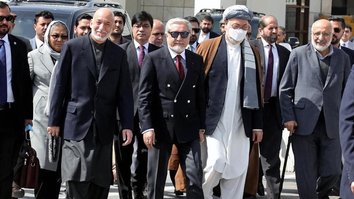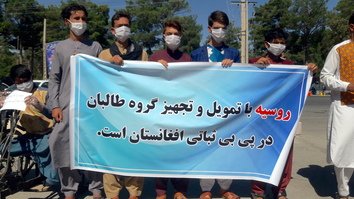Evidence of Moscow's malign influence in Afghanistan is continuing to grow, even as the Taliban and the Afghan government take part in peace talks.
When reports surfaced in early 2020 of Russian intelligence offering bounties to the Taliban for killing US and coalition troops in Afghanistan, many regional observers and analysts were not surprised.
This was primarily because over the past few years, Russian activity in Afghanistan -- specifically support for the Taliban -- had been steadily increasing.
Publicly, Moscow claims that it supports peace talks in Afghanistan and only maintains ties with the Taliban to counter the regional growth of the "Islamic State of Iraq and Syria" (ISIS) and to encourage the Taliban to negotiate with the Afghan government.
![This AFPTV screen grab from a video made on May 28, 2019, in Moscow shows a delegation of Taliban officials during a conference marking a century of diplomatic relations between Afghanistan and Russia, followed by discussions with Afghan politicians about the future of the country. [Nikolay Korzhov/AFPTV/AFP]](/cnmi_st/images/2020/11/20/27148-000_1h04v6-585_329.jpg)
This AFPTV screen grab from a video made on May 28, 2019, in Moscow shows a delegation of Taliban officials during a conference marking a century of diplomatic relations between Afghanistan and Russia, followed by discussions with Afghan politicians about the future of the country. [Nikolay Korzhov/AFPTV/AFP]
Malevolent intentions
However, the Kremlin's true intentions in Afghanistan are actually more malevolent.
It is no secret that the Kremlin callously views Afghanistan as a theatre in which to challenge the United States and its allies, regardless of any negative impact on the Afghan people.
This view is in large part shaped by a desire to avenge the former Soviet Union’s humiliating defeat in Afghanistan during the Cold War -- a loss that the Russian leadership blames on US involvement in the conflict.
In response, the Russian regime, under President Vladimir Putin, has adopted a two-pronged approach to counter the United States and its allies in Afghanistan.
The first approach involves providing diplomatic and political support to the Taliban to boost the group's legitimacy. The second, deadlier approach involves funneling weapons and funds to the Taliban to strengthen the group militarily.
Both approaches have proven to be disastrous for Afghanistan and its people.
False diplomacy
In a bid to increase the Taliban's political legitimacy, the Russian regime publicly hosted Taliban leaders in Moscow, along with other Afghan stakeholders, on multiple occasions, including an event to celebrate "Russo-Afghan friendship" in May 2019.
Additionally, in an attempt to portray itself as a viable alternative to Washington, the Putin administration invited the Taliban to attend so-called peace talks in Moscow in February 2019.
While several regional players and Afghan opposition members attended this event, the Afghan government declined, highlighting the dubious nature of the talks.
Predictably, Russian officials leveraged these occasions to criticise the presence of US forces in Afghanistan while glossing over Taliban attacks and atrocities targeting Afghan government forces and civilians.
While the Russian government continues to support the Taliban on the diplomatic and political front, numerous reports indicate that Russian intelligence actively funds and arms the insurgents.
Afghan and coalition forces have captured sophisticated Russian-made weapons from Taliban militants, including night vision equipment and small arms, during security operations nationwide, according to these reports.
In some instances, these weapons are believed to have been delivered via supply networks in Iran.
Evidence indicates that the Russian and Iranian regimes have collaborated to set up training camps and supply depots in Iran for Taliban members. Additionally, Moscow has been accused of funneling resources like oil, via Central Asia, to Taliban entities that sell them to generate funds for the insurgency.
Afghans suffer the consequences
The consequences and impact of the selfish and short-sighted Russian strategy on innocent Afghan civilians cannot be stressed enough.
At best, Russian political and material support indirectly enables the Taliban to carry out violent attacks throughout Afghanistan, which have resulted in killing or wounding thousands of civilians.
At worst, Moscow knowingly and actively abets the Taliban's unprovoked violence and atrocities.
In either case, aided by foreign support, the Taliban's illegal activities and attacks have spiked in recent months, even as the Afghan government and international community attempt to negotiate a peace deal with the militants in good faith.
A devastating suicide car bombing in Kabul on November 13, the assassination of Azadi Radio reporter Aliyas Dayee in Helmand November 12 and recent attacks on check-posts in Kunduz are just the latest examples of the Taliban's continuing violence.
Unfortunately, Afghan civil society and the economy bear the brunt of the consequences of foreign interference in the country. Continuing Taliban violence not only creates a sense of fear and anxiety among the civilian population, it suppresses economic activity and affects the livelihoods of countless Afghans.
In fact, Moscow's interference in Afghanistan sparked anti-Russia protests in several cities including Herat, Baghlan and Badakhshan as recently as July.
Given these facts, it is imperative for the Afghan government and the international community to remain vigilant and work collaboratively to counter foreign interference in Afghanistan from malign regional actors like Russia and Iran.
Moreover, as much as possible, such regimes must be held accountable for their illegitimate actions under international law in order to curb their disastrous interference in the affairs of other nations.

![A photograph taken last November 28 shows an Afghan boy playing on the wreckage of a Soviet-era tank on the outskirts of Kabul. [Noorullah Shirzada/AFP]](/cnmi_st/images/2020/11/20/27149-000_1n86-585_329.jpg)







Moscow and Tehran’s support with the Taliban was until the group was fighting against America. After Taliban signed a peace agreement with America, they no longer have the support of these two countries. Tehran and Moscow had an aim in supporting the Taliban, and their aim was to kill the American soldiers and to make America fail in its war against the Taliban. Now Taliban are not at war with America. Neither Moscow nor Tehran is cooperating with the Taliban, and they may even spend money and equip Fatemiyoun against the Taliban after Taliban reach to power, because Taliban are no longer useful for them and they are considered a threat to Moscow and Tehran.
Reply2 Comment
I think the real slaves of Moscow are not Taliban but the Northern Alliance of Afghanistan. Moscow is very much scared of Taliban. There is no doubt that Russia provided financial support to the Taliban against the American forces. Russia did this to defeat its long-standing enemy, America, and to make America withdraw from Afghanistan. Now that America is withdrawing from Afghanistan, Russia is scared of the return of Taliban, because Taliban will never be the slaves of Russia. The only people who are more dependent on Russia and obey Russia are Jamiat-e-Islami, Junbish-e- Islami and as a whole the Northern Alliance. They are directly in contact with Russia and receive millions of dollars annually from that country.
Reply2 Comment